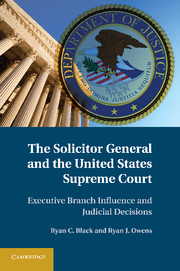 The Solicitor General and the United States Supreme Court
The Solicitor General and the United States Supreme Court Book contents
- Frontmatter
- Contents
- Acknowledgments
- 1 The Solicitor General and the Supreme Court
- 2 The Office of the Solicitor General: “The Finest Law Firm in the Nation”
- 3 Explanations for Solicitor General Success
- 4 Solicitor General Influence and Agenda Setting
- 5 Solicitor General Influence and Merits Outcomes
- 6 Solicitor General Influence and Briefs
- 7 Solicitor General Influence and Legal Doctrine
- 8 Conclusion
- Appendices
- References
- Index
6 - Solicitor General Influence and Briefs
Published online by Cambridge University Press: 05 May 2012
- Frontmatter
- Contents
- Acknowledgments
- 1 The Solicitor General and the Supreme Court
- 2 The Office of the Solicitor General: “The Finest Law Firm in the Nation”
- 3 Explanations for Solicitor General Success
- 4 Solicitor General Influence and Agenda Setting
- 5 Solicitor General Influence and Merits Outcomes
- 6 Solicitor General Influence and Briefs
- 7 Solicitor General Influence and Legal Doctrine
- 8 Conclusion
- Appendices
- References
- Index
Summary
It is hard to overstate the importance of the brief on an appeal. … [It] speaks from the time it is filed and continues through oral argument, conference, and opinion writing. Sometimes a brief will be read and reread, no one knows how many times.
– Judge Herbert F. Goodrich of the Third Circuit Court of AppealsIn Chapter 5, we observed that the office of the Solicitor General (OSG) enjoys a significant advantage in terms of victories over non-OSG attorneys. Even when attorneys outside the OSG have as much experience (and other relevant similarities) as OSG attorneys, the OSG is still more likely to prevail before the Supreme Court. Simply being affiliated with the OSG, the data showed, makes these attorneys more likely to win. Combined with our earlier findings in Chapter 4 that the OSG can influence justices to review cases they otherwise would not review, the findings in favor of OSG influence are beginning to stack up.
We cannot end there though, for the Court's role in crafting legal policy extends well beyond whether it reviews a case or whether a party wins or loses that case. To be sure, these are important considerations. Yet it is rather the content of the Supreme Court's opinions and the doctrine those opinions set that ultimately guide social behavior; that is, the Court's opinions generate legal policy, define its institutional legitimacy, and generate its power.
- Type
- Chapter
- Information
- The Solicitor General and the United States Supreme CourtExecutive Branch Influence and Judicial Decisions, pp. 92 - 112Publisher: Cambridge University PressPrint publication year: 2012


